- Home
- Frederick Marryat
The Privateersman
The Privateersman Read online
Produced by Nick Hodson of London, England
The Privateersman, by Captain Marryat.
________________________________________________________________________
Captain Frederick Marryat was born July 10 1792, and died August 8 1848.He retired from the British navy in 1828 in order to devote himself towriting. In the following 20 years he wrote 26 books, many of which areamong the very best of English literature, and some of which are stillin print.
Marryat had an extraordinary gift for the invention of episodes in hisstories. He says somewhere that when he sat down for the day's work, henever knew what he was going to write. He certainly was a literarygenius.
"The Privateersman" was published in 1846, the twenty-third book to flowfrom Marryat's pen. Privateering is legalised piracy at sea.
This e-text was transcribed in 1998 by Nick Hodson, and was reformattedin 2003.
________________________________________________________________________
THE PRIVATEERSMAN, BY CAPTAIN FREDERICK MARRYAT.
CHAPTER ONE.
WE CRUISE OFF HISPANIOLA--CAPTURE OF A FRENCH SHIP--CONTINUE OURCRUISE--MAKE A NOCTURNAL ATTACK UPON A RICH PLANTER'S DWELLING--AREREPULSED WITH LOSS.
_To Mistress_ ---.
_Respected Madam_,
In compliance with your request I shall now transcribe from the journalof my younger days some portions of my adventurous life. When I wrote,I painted the feelings of my heart without reserve, and I shall notalter one word, as I know you wish to learn what my feelings were then,and not what my thoughts may be now. They say that in every man's life,however obscure his position may be, there would be a moral found, wereit truly told. I think, Madam, when you have perused what I am about towrite, you will agree with me, that from my history both old and youngmay gather profit, and I trust, if ever it should be made public, that,by Divine permission, such may be the result. Without further preface Ishall commence with a narrative of my cruise off Hispaniola, in theRevenge privateer.
The Revenge mounted fourteen guns, and was commanded by CaptainWeatherall, a very noted privateer's-man. One morning at daybreak wediscovered a vessel from the masthead, and immediately made all sail inchase, crowding every stitch of canvass. As we neared, we made her outto be a large ship, deeply laden, and we imagined that she would be aneasy prize; but as we saw her hull more out of the water, she proved tobe well armed, having a full tier of guns fore and aft. As itafterwards proved, she was a vessel of 600 tons burden, and mountedtwenty-four guns, having sailed from Saint Domingo, and being bound toFrance.
She had been chartered by a French gentleman (and a most gallant fellowwe found him), who had acquired a large fortune in the West Indies, andwas then going home, having embarked on board his whole property, aswell as his wife and his only son, a youth of about seventeen. As soonas he discovered what we were, and the impossibility of escape from sofast a sailing vessel as the Revenge, he resolved to fight us to thelast. Indeed he had everything to fight for; his whole property, hiswife and his only child, his own liberty, and perhaps life, were all atstake, and he had every motive that could stimulate a man. As wesubsequently learnt, he had great difficulty in inspiring the crew withan equal resolution, and it was not until he had engaged to pay them thevalue of half the cargo, provided they succeeded in beating us off andforcing their way in safety to France, that he could rouse them to theirduty.
Won by his example, for he told them that he did not desire any man todo more than he would do himself, and perhaps more induced by hisgenerous offer, the French crew declared they would support him to thelast, went cheerfully to their guns, and prepared for action. When wewere pretty near to him, he shortened sail ready for the combat, havingtenderly forced his wife down below to await in agony the issue of abattle on which depended everything so dear to her. The resolutebearing of the vessel, and the cool intrepidity with which they hadhove-to to await us, made us also prepare on our side for a combat whichwe knew would be severe. Although she was superior to us in guns, yet,the Revenge being wholly fitted for war, we had many advantages,independent of our being very superior in men. Some few chase-guns werefired during our approach, when, having ranged up within a cable'slength of her, we exchanged broadsides for half an hour, after which ourcaptain determined upon boarding. We ran our vessel alongside, andattempted to throw our men on board, but met with a stout resistance.The French gentleman, who was at the head of his men, with his own handkilled two of our stoutest seamen, and mortally wounded a third, and,encouraged by his example, his people fought with such resolution thatafter a severe struggle we were obliged to retreat precipitately intoour own vessel, leaving eight or ten of our shipmates weltering in theirblood.
Our captain, who had not boarded with us, was much enraged at ourdefeat, stigmatising us as cowards for allowing ourselves to be drivenfrom a deck upon which we had obtained a footing; he called upon us torenew the combat, and leading the way he was the first on board of thevessel, and was engaged hand to hand with the brave French gentleman whohad already made such slaughter among our men. Brave and expert withhis weapon as Captain Weatherall undoubtedly was, he for once foundrather more than a match in his antagonist; he was slightly wounded, andwould, I suspect, have had the worst of this hand-to-hand conflict, hadnot the whole of our crew, who had now gained the deck, and were rushingforward, separated him from his opponent. Out-numbered andover-matched, the French crew fought most resolutely, butnotwithstanding their exertions, and the gallant conduct of theirleader, we succeeded in driving them back to the quarter-deck of thevessel. Here the combat was renewed with the greatest obstinacy, theystriving to maintain this their last hold, and we exerting ourselves tocomplete our conquest. The Frenchmen could retreat no further, and ourforemost men were impelled against them by those behind them crowding onto share in the combat. Retreat being cut off, the French struggledwith all the animosity and rage of mingled hate and despair; while we,infuriated at the obstinate resistance, were filled with vengeance and athirst for blood. Wedged into one mass, we grappled together, for therewas no room for fair fighting, seeking each other's hearts withshortened weapons, struggling and falling together on the deck, rollingamong the dead and the dying, or trodden underfoot by the others whostill maintained the combat with unabated fury.
Numbers at last prevailed; we had gained a dear-bought victory--we weremasters of the deck, we had struck the colours, and were recovering ourlost breaths after this very severe contest, and thought ourselves infull possession of the ship; but it proved otherwise. Thefirst-lieutenant of the privateer and six of us had dashed down thecompanion, and were entering the cabin in search of plunder, when wefound opposed to our entrance the gallant French gentleman, supported byhis son, the captain of the vessel, and five of the French sailors;behind them was the French gentleman's wife, to whose protection theyhad devoted themselves. The lieutenant, who headed us, offered themquarter, but, stung to madness at the prospect of the ruin and of thecaptivity which awaited him, the gentleman treated the offer withcontempt, and rushing forward attacked our lieutenant, beating down hisguard, and was just about to pierce him with the lunge which he made,when I fired my pistol at him to save the life of my officer. The ballentered his heart, and thus died one of the bravest men I everencountered. His son at the same time was felled to the deck with apole-axe, when the remainder threw themselves down on the deck and criedfor quarter. So enraged were our men at this renewal of the combat thatit required all the efforts and authority of the lieutenant to preventthem from completing the massacre by taking the lives of those who nolonger resisted. But who could paint the condition of that unhappy ladywho had stood a witness of the horrid scene--her eyes blasted with thesight of her husband slain before h
er face, her only son groaning on thedeck and weltering in his blood; and she left alone, bereft of all thatwas dear to her; stripped of the wealth she was that morning mistressof, now a widow, perhaps childless, a prisoner, a beggar, and in thehands of lawless ruffians, whose hands were reeking with her husband'sand offspring's blood, at their mercy, and exposed to every evil whichmust befall a beautiful and unprotected female from those who weredevoid of all principle, all pity, and all fear! Well might the franticcreature rush as she did upon our weapons, and seek that death whichwould have been a mercy and a blessing. With difficulty we preventedher from injuring herself, and, after a violent struggle, natureyielded, and she sank down in a swoon on the body of her husband,dabbling her clothes and hair in the gore which floated on thecabin-deck. This scene of misery shocked even the actors in it. Oursailors, accustomed as they were to blood and rapine, remained silentand immoveable, resting upon their weapons, their eyes fixed upon theunconscious form of that unhappy lady.
The rage of battle was now over, our passions had subsided, and we feltashamed of a conquest purchased with such unutterable anguish. Thenoise of this renewed combat had brought down the captain; he orderedthe lady to be taken away from this scene of horror, and to be carefullytended in his own cabin; the wound of the son, who was found stillalive, was immediately dressed, and the prisoners were secured. Ireturned on deck, still oppressed with the scene I had witnessed, andwhen I looked round me, and beheld the deck strewed with the dead anddying--victors and vanquished indiscriminately mixed up together--theblood of both nations meeting on the deck and joining their streams, Icould not help putting the question to myself, "Can this be right andlawful--all this carnage to obtain the property of others, and madelegal by the quarrels of kings?" Reason, religion, and humanityanswered, "No."
I remained uneasy and dissatisfied, and felt as if I were a murderer;and then I reflected how this property, thus wrested from its formerpossessor, who might, if he had retained it, have done much good withit, would now be squandered away in riot and dissipation, in purchasingcrime and administering to debauchery. I was young then, and felt sodisgusted and so angry with myself and everybody else, that if I hadbeen in England I probably should never again have put my foot on boardof a privateer.
But employment prevented my thinking; the decks had to be cleaned, thebodies thrown overboard, the blood washed from the white planks, thewounded to be removed and their hurts dressed, the rigging and otherdamages to be repaired, and when all this had been done we made sail forJamaica with our prize. Our captain, who was as kind and gentle to thevanquished as he was brave and resolute in action, endeavoured by allthe means he could think of to soften the captivity and sufferings ofthe lady. Her clothes, jewels, and everything belonging to her, werepreserved untouched; he would not even allow her trunks to be searched,and would have secured for her even all her husband's personal effects,but the crew had seized upon them as plunder, and refused to deliverthem up. I am almost ashamed to say that the sword and watch of herhusband fell to my lot, and, whether from my wearing the sword, or fromhaving seen me fire the pistol which had killed him, the lady alwaysexpressed her abhorrence of me whenever I entered her presence. Her sonrecovered slowly from his wound, and on our arrival at Port Royal waspermitted by the admiral to be sent to the King's Hospital, and thelady, who was most tenderly attached to him, went on shore and remainedat the Hospital to attend upon him. I was glad when she was gone, for Iknew how much cause she had for her hatred of me, and I could not seeher without remorse. As soon, as we had completed our repairs, filledup our provisions and water, we sailed upon another cruise, which wasnot so successful, as you will presently perceive.
For five or six weeks we cruised without success, and our people beganto grumble, when one morning our boats in shore off Hispaniola surpriseda small schooner. A negro who was among the prisoners offered toconduct us through the woods by night to the house of a very richplanter, which was situated about three miles from a small bay, and atsome distance from the other plantations. He asserted that we mightthere get very valuable plunder, and, moreover, obtain a large ransomfor the planter and his family, besides bringing away as many of thenegro slaves as we pleased.
Our captain, who was tired of his ill-success, and who hoped also toprocure provisions, which we very much wanted, consented to the negro'sproposal, and standing down abreast of the bay, which was in the Bightof Lugan, he ran in at dark, and anchoring close to the shore we landedwith forty men, and, guided by the negro, we proceeded through the woodsto the house. The negro was tied fast to one of our stoutest and bestmen, for fear he should give us the slip. It was a bright moonlight; wesoon arrived, and surrounding the house forced our way in withoutopposition. Having secured the negroes in the out-houses, and placedguards over them, and videttes on the look-out to give timely notice ofany surprise, we proceeded to our work of plunder. The family,consisting of the old planter and his wife and his three daughters, twoof them very beautiful, was secured in one room. No words can expresstheir terror at thus finding themselves so suddenly in the power of aset of ruffians, from whose brutality they anticipated every evil.Indeed, the horrid excesses committed by the privateersmen when theylanded on the coast fully justified their fears; for as this system ofmarauding is considered the basest of all modern warfare, no quarter isever given to those who are taken in the attempt. In return, theprivateersmen hesitate at no barbarity when engaged in such enterprises.
Dumb with astonishment and terror, the old couple sat in silent agony,while the poor girls, who had more evils than death to fear, drowned intheir tears fell at the captain's feet and embraced his knees, conjuringhim to spare and protect them from his men.
Captain Weatherall, who was, as I have before stated, a generous andhumane man, raised them up, assuring them, on his word, that they shouldreceive no insult; and as his presence was necessary to direct themotions of his people, he selected me, as younger and less brutal thanmost of his crew, as a guard over them, menacing me with death if Iallowed any man to enter the room until he returned, and ordering me todefend them with my life from all insults. I was then young and full ofenthusiasm; my heart was kind, and I was pure in comparison with themajor portion of those with whom I was associated.
I was delighted with the office confided to me, and my heart leaped athaving so honourable an employment. I endeavoured by every means in mypower to dissipate their terrors and soothe their anxious minds; butwhile I was thus employed, an Irish seaman, distinguished even amongstour crew for his atrocities, came to the door, and would have forced hisentrance. I instantly opposed him, urging the captain's most positivecommands; but, having obtained a sight of the young females, he sworewith a vile oath that he would soon find out whether a boy like me wasable to oppose him, and finding that I would not give way he attacked mefiercely. Fortunately I had the advantage of position, and, supportedby the justice of my cause, I repelled him with success. But he renewedthe attack, while the poor young women awaited the issue of the combatwith trembling anxiety--a combat on which depended, in all probability,their honour and their lives. At last I found myself very hard pushed,for I had received a wound on my sword arm, and I drew a pistol from mybelt with my left hand, and fired it, wounding him in the shoulder.Thus disabled, and fearing at the same time that the report would bringback the captain, who he well knew would not be trifled with, he retiredfrom the door vowing vengeance. I then turned to the young women, whohad witnessed the conflict in breathless suspense, encircled in the armsof the poor old couple, who had rushed towards them at the commencementof the fray, offering them their useless shelter. Privateersman as Iwas, I could not refrain from tears at the scene. I again attempted tore-assure them, pledged myself in the most solemn manner to forfeit mylife if necessary for their protection, and they in some degree regainedtheir confidence. They observed the blood trickling down my fingersfrom the wound which I had received, and the poor girls stained theirhandkerchiefs with it in the attempts to s
taunch the flow.
But this scene was soon interrupted by an alarm. It appeared that anegro had contrived to escape and to rouse the country. They hadcollected together from the other plantations, and our party being, asis usually the case when plunder is going on, very negligent, thevidettes were surprised, and had hardly time to escape and apprise us ofour danger. There was not a moment to be lost; our safety depended uponan immediate retreat. The captain collected all hands; and while he wasgetting them together, that the retreat might be made in good order, theold planter, who, by the report of the fire-arms and the bustle andconfusion without, guessed what had taken place, pressed me to remainwith them, urging the certainty of our men being overpowered, and themerciless consequences which would ensue. He pledged himself, with hisfingers crossed in the form of the crucifix, that he would procure mesafe quarter, and that I should ever enjoy his protection andfriendship. I refused him kindly but firmly, and he sighed and said nomore. The old lady put a ring on my finger, which she took from her ownhand, and kissing my forehead told me to look at that ring and continueto do good and act nobly as I had just done.
I waved my hand, for I had no time even to take the proffered hands ofthe young ones, and hastened to join my shipmates, already on theretreat, and exchanging shots with our pursuers. We were harassed by amultitude, but they were a mixed company of planters, mulattoes, andslaves, and not half of them armed, and we easily repelled their attackswhenever they came to close quarters. Their violent animosity, however,against us and our evil doings induced them to follow close at ourheels, keeping up a galling irregular fire, and endeavouring to detainus until we might be overpowered by their numbers, every minuteincreasing, for the whole country had been raised, and were flocking in.This our captain was well aware of, and therefore made all the hastethat he could, without disturbing the regularity of his retreat, towhere our boats were lying, as should they be surprised and cut off ourescape would have been impossible. Notwithstanding all his care,several of our men were separated from us by the intricacies of thewood, or from wounds which they had received, and which prevented themfrom keeping up with us. At last, after repelling many attacks, eachtime more formidable than the preceding, we gained our boats, andembarking with the greatest precipitation we put off for the schooner.The enemy, emboldened by our flight, flocked down in great numbers tothe water's edge, and we had the mortification to hear our stragglerswho had been captured imploring for mercy; but groans and then silencetoo plainly informed us that mercy had been denied.
Captain Weatherall was so enraged at the loss of his men that he orderedus to pull back and attack the enemy on the beach, but we continued topull for the schooner, regardless of his threats and entreaties. Apanic had seized us all, as well it might. We even dreaded theill-aimed and irregular fire which they poured upon us, which underother circumstances would have occasioned only laughter. The schoonerhad been anchored only two hundred yards from the beach, and we weresoon on board. They continued to fire from the shore, and the ballspassed over us. We put a spring upon our cable, warped our broadside tothe beach, and loading every gun with grape and cannister we poured awhole broadside upon our assailants. From the shrieks and cries, thecarnage must have been very great. The men would have reloaded andfired again, but the captain forbade them, saying, "We have done toomuch already." I thought so too. He then ordered the anchor to beweighed, and with a fresh land breeze we were soon far away from thisunlucky spot.

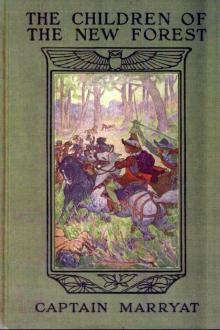 The Children of the New Forest
The Children of the New Forest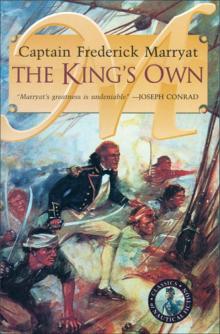 The King's Own
The King's Own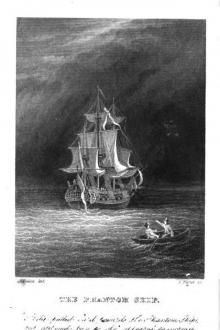 The Phantom Ship
The Phantom Ship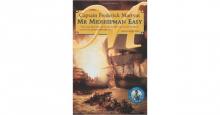 Mr. Midshipman Easy
Mr. Midshipman Easy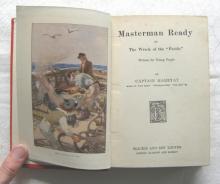 Masterman Ready; Or, The Wreck of the Pacific
Masterman Ready; Or, The Wreck of the Pacific Peter Simple; and, The Three Cutters, Vol. 1-2
Peter Simple; and, The Three Cutters, Vol. 1-2 Travels and Adventures of Monsieur Violet
Travels and Adventures of Monsieur Violet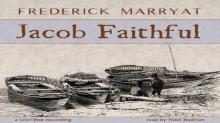 Jacob Faithful
Jacob Faithful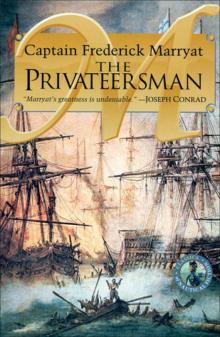 The Privateersman
The Privateersman Newton Forster
Newton Forster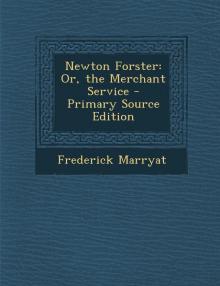 Newton Forster; Or, The Merchant Service
Newton Forster; Or, The Merchant Service The Pacha of Many Tales
The Pacha of Many Tales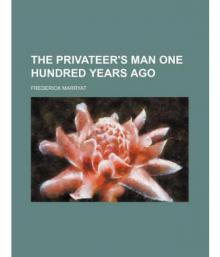 The Privateer's-Man, One hundred Years Ago
The Privateer's-Man, One hundred Years Ago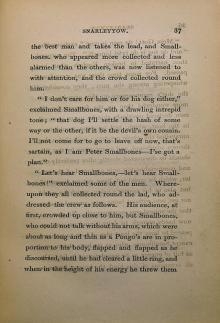 Snarleyyow, or, the Dog Fiend
Snarleyyow, or, the Dog Fiend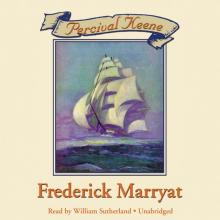 Percival Keene
Percival Keene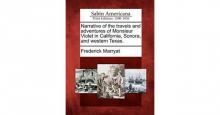 The Travels and Adventures of Monsieur Violet in California, Sonora, and Western Texas
The Travels and Adventures of Monsieur Violet in California, Sonora, and Western Texas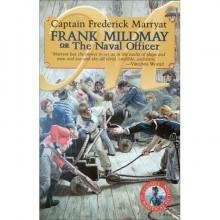 Frank Mildmay; Or, the Naval Officer
Frank Mildmay; Or, the Naval Officer The Mission
The Mission